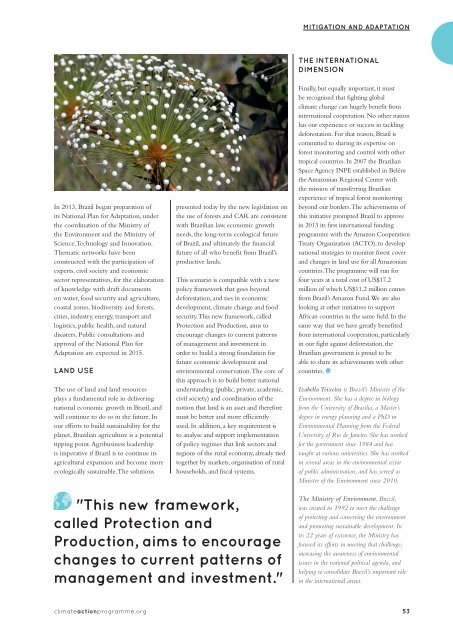Climate Action 2014-2015
You also want an ePaper? Increase the reach of your titles
YUMPU automatically turns print PDFs into web optimized ePapers that Google loves.
MITIGATION AND ADAPTATION<br />
THE INTERNATIONAL<br />
DIMENSION<br />
In 2013, Brazil began preparation of<br />
its National Plan for Adaptation, under<br />
the coordination of the Ministry of<br />
the Environment and the Ministry of<br />
Science, Technology and Innovation.<br />
Thematic networks have been<br />
constructed with the participation of<br />
experts, civil society and economic<br />
sector representatives, for the elaboration<br />
of knowledge with draft documents<br />
on water, food security and agriculture,<br />
coastal zones, biodiversity and forests,<br />
cities, industry, energy, transport and<br />
logistics, public health, and natural<br />
disasters. Public consultations and<br />
approval of the National Plan for<br />
Adaptation are expected in <strong>2015</strong>.<br />
LAND USE<br />
The use of land and land resources<br />
plays a fundamental role in delivering<br />
national economic growth in Brazil, and<br />
will continue to do so in the future. In<br />
our efforts to build sustainability for the<br />
planet, Brazilian agriculture is a potential<br />
tipping point. Agribusiness leadership<br />
is imperative if Brazil is to continue its<br />
agricultural expansion and become more<br />
ecologically sustainable. The solutions<br />
presented today by the new legislation on<br />
the use of forests and CAR are consistent<br />
with Brazilian law, economic growth<br />
needs, the long-term ecological future<br />
of Brazil, and ultimately the financial<br />
future of all who benefit from Brazil’s<br />
productive lands.<br />
This scenario is compatible with a new<br />
policy framework that goes beyond<br />
deforestation, and ties in economic<br />
development, climate change and food<br />
security. This new framework, called<br />
Protection and Production, aims to<br />
encourage changes to current patterns<br />
of management and investment in<br />
order to build a strong foundation for<br />
future economic development and<br />
environmental conservation. The core of<br />
this approach is to build better national<br />
understanding (public, private, academic,<br />
civil society) and coordination of the<br />
notion that land is an asset and therefore<br />
must be better and more efficiently<br />
used. In addition, a key requirement is<br />
to analyse and support implementation<br />
of policy regimes that link sectors and<br />
regions of the rural economy, already tied<br />
together by markets, organisation of rural<br />
households, and fiscal systems.<br />
Finally, but equally important, it must<br />
be recognised that fighting global<br />
climate change can hugely benefit from<br />
international cooperation. No other nation<br />
has our experience or success in tackling<br />
deforestation. For that reason, Brazil is<br />
committed to sharing its expertise on<br />
forest monitoring and control with other<br />
tropical countries. In 2007 the Brazilian<br />
Space Agency INPE established in Belém<br />
the Amazonian Regional Center with<br />
the mission of transferring Brazilian<br />
experience of tropical forest monitoring<br />
beyond our borders. The achievements of<br />
this initiative prompted Brazil to approve<br />
in 2013 its first international funding<br />
programme with the Amazon Cooperation<br />
Treaty Organization (ACTO), to develop<br />
national strategies to monitor forest cover<br />
and changes in land use for all Amazonian<br />
countries. The programme will run for<br />
four years at a total cost of US$17.2<br />
million of which US$11.2 million comes<br />
from Brazil’s Amazon Fund. We are also<br />
looking at other initiatives to support<br />
African countries in the same field. In the<br />
same way that we have greatly benefited<br />
from international cooperation, particularly<br />
in our fight against deforestation, the<br />
Brazilian government is proud to be<br />
able to share its achievements with other<br />
countries. <br />
Izabella Teixeira is Brazil’s Minister of the<br />
Environment. She has a degree in biology<br />
from the University of Brasilia, a Master’s<br />
degree in energy planning and a PhD in<br />
Environmental Planning from the Federal<br />
University of Rio de Janeiro. She has worked<br />
for the government since 1984 and has<br />
taught at various universities. She has worked<br />
in several areas in the environmental sector<br />
of public administration, and has served as<br />
Minister of the Environment since 2010.<br />
"This new framework,<br />
called Protection and<br />
Production, aims to encourage<br />
changes to current patterns of<br />
management and investment."<br />
The Ministry of Environment, Brazil,<br />
was created in 1992 to meet the challenge<br />
of protecting and conserving the environment<br />
and promoting sustainable development. In<br />
its 22 years of existence, the Ministry has<br />
focused its efforts in meeting that challenge,<br />
increasing the awareness of environmental<br />
issues in the national political agenda, and<br />
helping to consolidate Brazil’s important role<br />
in the international arena.<br />
climateactionprogramme.org 53












